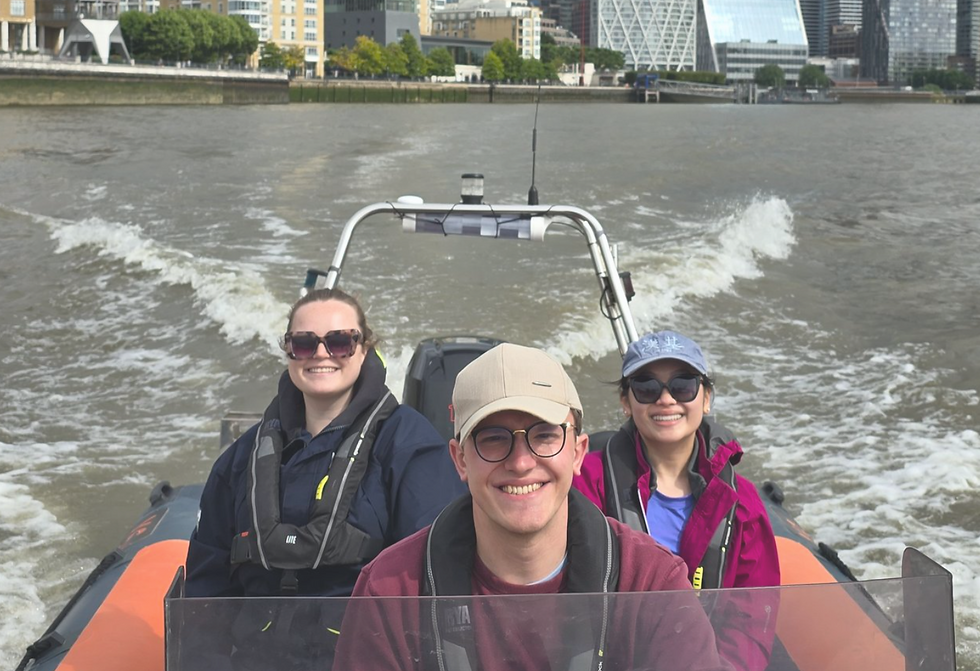Skills You Need for Safe Powerboat Handling
- Paul Bew City Sailing

- Sep 2
- 4 min read
Powerboating is an exhilarating experience, offering the freedom to explore vast bodies of water and appreciate nature's beauty. However, the thrill of this activity should not overshadow the critical skills needed for safe powerboat handling. Whether you are a novice or an experienced boater, understanding the essential skills involved is key to ensuring safety and enjoyment on the water.
Powerboat Skills Every Boater Should Have
Handling a powerboat requires a unique set of skills that ensure safe navigation and operation. Here are some core skills that every powerboater should master:
Boat Control: Learning how to maneuver the boat is fundamental. This includes understanding throttle control, steering, and what to do in various weather conditions. It's vital to practice controlling speed and direction before venturing out on the open water.
Safety Procedures: Knowing safety protocols can make a significant difference in emergencies. Always wear a life jacket and know how to operate fire extinguishers, signaling devices, and first-aid equipment.
Understanding Weather Conditions: Weather plays a crucial role in powerboating safety. A good boater must learn to read weather patterns and recognize dangers such as storms, high winds, or sudden changes in water conditions.
Navigational Skills: Effective navigation is essential for avoiding obstacles and ensuring a smooth journey. Familiarize yourself with maps, GPS systems, and how to read navigational aids, like buoys.
Communication Abilities: Clear communication with your crew and other vessels is important. Knowing how to use marine radios, as well as RYA First Aid and RYA Sea Survival, is crucial for safe navigation.

Importance of Continuous Learning in Powerboating
Even experienced operators can benefit from ongoing education and training. Boat operators should keep themselves updated on the latest safety regulations and navigational techniques. Attending refresher courses or obtaining certifications from recognized programs can greatly enhance your skills. A great option to consider is the RYA powerboat level 2 course, which provides hands-on training and knowledge essential for safe powerboating.
What is RYA Powerboat Level 2 in Europe?
The RYA Powerboat Level 2 is a recognized qualification in the UK that teaches students the basics of powerboat handling and safety. This course is designed for beginners who want to gain practical experience while learning the essential skills needed to handle a powerboat.
Key topics covered include:
Practical boat handling skills
Safety management
On-water emergency procedures
Navigation techniques
Environmental considerations
Upon completion, participants receive a RYA certification that is valuable for both personal use and professional opportunities.

Essential Equipment for Safe Powerboat Handling
Having the right equipment can significantly enhance your boating experience. Here are some essentials every powerboater should have:
Life Jackets: Ensure that you have life jackets for every person on board. They should fit properly.
Fire Extinguishers: Check that your boat is equipped with suitable fire extinguishers, particularly if you have fuel storage onboard.
First Aid Kit: A well-stocked first aid kit can handle minor injuries and emergencies. Ensure it is easily accessible in case of need.
Navigation Tools: Bring charts, a compass, and GPS devices to ensure you can navigate safely. It's also wise to have backup methods in case technology fails.
Communication Devices: Marine radios and mobile phones should be included to maintain communication with other boats or emergency services.
Practical Tips for Confident Powerboat Operation
To become a proficient powerboater, integrate these practical tips into your routine:
Practice Regularly: The more time you spend on the water, the more familiar you will become with handling your boat. Schedule regular outings to practice different power boating skills.
Know Your Limits: Always be aware of your skill level and understand that conditions can change quickly. Avoid venturing into areas that exceed your comfort and experience levels.
Pre-Departure Checks: Conduct thorough checks before leaving the dock. Inspect your equipment, fuel levels, and ensure all safety devices are functional.
Stay Aware and Attentive: Keep an eye on your surroundings at all times. Awareness of other vessels, swimmers, and potential hazards is crucial for safe navigation.
Stay Educated: Keep learning about new techniques, safety practices, and regulatory updates. Classes and online resources can be invaluable.
The Long-term Benefits of Powerboating Skills
Gaining proficiency in powerboat handling leads to numerous advantages:
Enhanced Safety: Understanding how to operate a powerboat safely reduces risks for yourself and your passengers.
Increased Enjoyment: The more skilled you become, the more you can enjoy the freedom that comes with boating, exploring places you may not have felt comfortable visiting as a novice.
Expanded Opportunities: With qualifications like the RYA Powerboat Level 2, you open doors to new adventures and possible career paths in the maritime industry.
Powerboating is an exciting activity that opens up new experiences and adventures. By focusing on essential skills, utilizing the right equipment, and committing to continuous learning, you can master powerboat handling safely. Take the plunge, invest in your education, and enjoy the waves while ensuring the highest level of safety for you and your fellow boaters.
















Comments